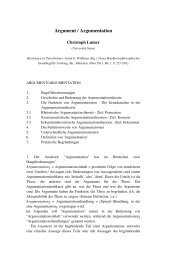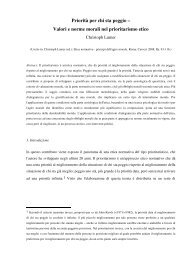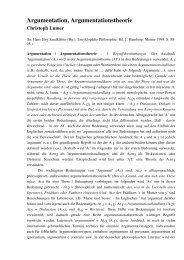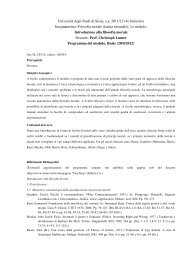What is Practical Knowledge? - Prof. Dr. Christoph Lumer
What is Practical Knowledge? - Prof. Dr. Christoph Lumer
What is Practical Knowledge? - Prof. Dr. Christoph Lumer
You also want an ePaper? Increase the reach of your titles
YUMPU automatically turns print PDFs into web optimized ePapers that Google loves.
<strong>Lumer</strong>: <strong>What</strong> Is <strong>Practical</strong> <strong>Knowledge</strong>? 8th<strong>is</strong> cognitive impact, there has to be a certain motivational sensibility too, to react on th<strong>is</strong> kind ofcognitions, e.g. the cognition that someone next to us urgently needs our help, and not on others,e.g. cognitions that certain objects are blue. Now th<strong>is</strong> sensibility cannot be a quality of theperceived object and its forces, it has to be something subjective, appertaining to our motivationalapparatus. The general lesson to be learned from th<strong>is</strong> critic<strong>is</strong>m <strong>is</strong> that the motivational effect ofsome reality cannot be an objective quality of th<strong>is</strong> reality; the motivational effect always dependson the motivational make-up of the respective subject.3.2. Kantian<strong>is</strong>m 2Kant's conception of practical knowledge <strong>is</strong> to identify it with a priori justified imperatives. Beingjustified a priori they cannot rely on personal inclinations and motives (e.g. Kant 1785/1786, BAVIII-X; 27-29; 32 f.; 34; 36 f.; 59; 63 f.; 77; 90). Therefore Kant <strong>is</strong> a foundational external<strong>is</strong>t.Nonetheless he thinks that these imperatives are, not always but at least often, practical; and beingmotivated by them <strong>is</strong> the only way of acting morally (Kant 1785/1786, BA X-XII; 26). Thereforehe <strong>is</strong> an effective internal<strong>is</strong>t.From the perspective developed here, th<strong>is</strong> project can be criticized with respect to thenormative as well as with respect to the empirical part. Korsgaard has named the respective lines ofcritic<strong>is</strong>m "content skeptic<strong>is</strong>m" and "motivational skeptic<strong>is</strong>m about practical reason" (Korsgaard1986, p. 311). With respect to the normative part, it <strong>is</strong> unclear how a priori truths could orientate usin our actions. To begin with the first formula of the Categorical Imperative, it <strong>is</strong> already unclearwhy we should always follow universalized maxims, i.e. laws (Kant 1785/1786, BA 17; 52). 3 <strong>What</strong><strong>is</strong> more important, however, <strong>is</strong> that Kant's idea to select the content of the general moral law merelyon the bas<strong>is</strong> of the form of such laws leads only to an imperative of the form: 'Act always accordingto universal maxims!' Such an imperative, however, <strong>is</strong> completely empty 4, it does not forbid anysingle action. Of course, th<strong>is</strong> <strong>is</strong> not the first formula of the Categorical Imperative. Kant has addedto it, first, that it must be possible that the universal maxim <strong>is</strong> realized as a universal law and,second, that the moral subject can want th<strong>is</strong> maxim to be realized universally. Both these additionsdo not in any way follow from Kant's formal idea. Furthermore, the resulting CategoricalImperative <strong>is</strong> still void. For every kind of self-interested action we can find a law that fulfils theconditions of the Categorical Imperative. The general and well-known problem behind th<strong>is</strong> failure<strong>is</strong> that an a priori reflecting reason can only find analytical truths, in particular truths about actions,but it cannot determine which of these truths <strong>is</strong> or should be practically relevant in the sense that if2 Some of the following critic<strong>is</strong>ms to Kant have been elaborated in: <strong>Lumer</strong> 2002/03.3 Kant defends the universality requirement e.g. by holding that it has to be fulfilled by making moralrequirements binding (Kant 1785/1786, BA VIII; 59); however, here he seems to confuse deontologicalnecessity with a priori necessity. The problem <strong>is</strong> not that the universality requirement <strong>is</strong> false (maybe yes,maybe no) but that there are no a priori reasons for it or no a priori reasons why a rational subject shouldfollow only general norms.4 'Everybody should cheat whenever th<strong>is</strong> <strong>is</strong> advantageous for him!' and 'Nobody should ever cheat!' e.g. are bothuniversal.





![Vorwort [Biographie und Laudatio Wolfgang Lenzen]](https://img.yumpu.com/40262871/1/184x260/vorwort-biographie-und-laudatio-wolfgang-lenzen.jpg?quality=85)

